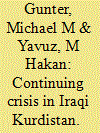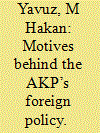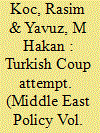| Srl | Item |
| 1 |
ID:
060944


|
|
|
| 2 |
ID:
078791


|
|
|
| 3 |
ID:
068962


|
|
|
| 4 |
ID:
187477


|
|
|
|
|
| Summary/Abstract |
This paper examines the role of ideas and identities in the making of the AKP’s foreign policy in Turkey. After briefly examining the institutional and international constraints on Turkish foreign policy before 2002, the discussion turns to the driving factors in three evolutionary stages of AKP’s foreign policy. It becomes apparent that a neo-Ottoman worldview and accompanying identity constitute the interpretive framework of the AKP’s political elite. The article traces how this worldview became dominant in Turkey’s policy making after the government dismantled the country’s Kemalist institutions and the AKP consolidated its political power.
|
|
|
|
|
|
|
|
|
|
|
|
|
|
|
|
| 5 |
ID:
149125


|
|
|
|
|
| Summary/Abstract |
When the Justice and Development Party (AKP) came to power in 2002, it encountered major resistance from state institutions, especially the secularist military, due to its Islamist roots and antisecular rhetoric. In an effort to counter the military and control state institutions, then-Prime Minister Recep Tayyip Erdoğan appointed followers of Fethullah Gülen to key government positions. This administrative support from the Gülen movement enabled the AKP to govern the country and closely monitor the military with the help of the police force. In order to consolidate his reputation as a moderately liberal Muslim leader, Erdoğan endorsed Turkey's joining the European Union, believing that membership in the EU would help grow the economy and build a democratic society.
|
|
|
|
|
|
|
|
|
|
|
|
|
|
|
|
| 6 |
ID:
173149


|
|
|
|
|
| Summary/Abstract |
This article examines the debate involving Turkish and Armenian historiography about the fate of diverse Armenian communities in eastern Anatolia. It argues that the contemporary description of the events in 1915, especially the legal description, is much more important than the facts and the role of human agency in which these facts were produced. Armenian historiography scholars have moved to label the set of complicated events and processes as ‘genocide,’ and they seek to delegitimize any argument or factual case pointing outside the term of genocide as denialism. Scholars representing Turkish historiography, on the other hand, emphasize a different context of ethnic cleansing and massacres of the Muslims in the Balkans and their unintended consequences in Anatolia, while insisting on the role of major powers and Armenian revolutionary groups to carve out eastern Anatolia as an Armenian national homeland. The article explores how the Armenian side has urged judicial forums and countries to rewrite and reinterpret history in order to canonize its description of the events as genocide by ignoring the political context, intentions and policies of Armenian revolutionary organizations during that critical period. It proposes a path in which diametrically opposing sides can come together by humanizing the mutual suffering of each group and developing a shared language that encompasses the mutual impact of the events of 1915.
|
|
|
|
|
|
|
|
|
|
|
|
|
|
|
|